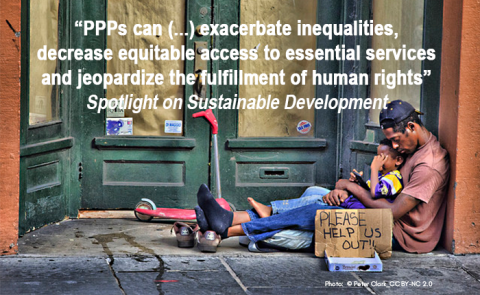PPP: Corporations divert UN agenda, claims civil society report

“The proponents of privatization and public-private partnerships (PPPs) present the state as impoverished and unfit to deliver, leaving the private sector as the only way to provide the necessary means for implementing the SDGs”.
But “PPPs can even exacerbate inequalities, decrease equitable access to essential services and jeopardize the fulfillment of human rights”, state the authors, based on experiences and reports by national and regional groups from all parts of the world.
While governments at the High-Level Political Forum of the UN review the implementation of SDG 9 (infrastructure and industrialization) today, the Spotlight Report warns that the next generation of PPPs in infrastructure will add another complication: "they are designed to meet the needs of large institutional investors, composed mainly of capitalized pension funds, insurance funds and sovereign wealth funds. They will become subject to their needs and machinations, as opposed to meeting the needs of the most vulnerable.”
The Spotlight Report concludes that
“It is high time to reclaim public policy space and take bold measures to strengthen public finance, regulate or reject PPPs and weaken the grip of corporate power on people’s lives. In short, to put ‘people over profit’.”
The Spotlight on Sustainable Development 2017 Report is published by the Arab NGO Network for Development (ANND), the Center for Economic and Social Rights (CESR), Development Alternatives with Women for a New Era (DAWN), Global Policy Forum (GPF), Public Services International (PSI), Social Watch, Society for International Development (SID), and Third World Network (TWN), supported by the Friedrich Ebert Foundation.
It provides the most comprehensive independent assessment of the implementation of the 2030 Agenda and its Sustainable Development Goals (SDGs).
For more information:
- Press Release Civil society groups reclaim policies for the public
- Press Release World Bank plan to mobilize “trillions” will not help the poor
- Press Release Corporate power threatens women´s human rights
- CSO Reflection Group website: Spotlight on Sustainable Development
- PSI's page: 2030 Agenda for Sustainable Development
- PSI''s work on Privatisation and PPPs
- Download a PDF of the full report

